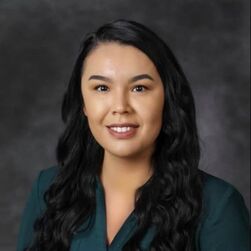
Lynn Mad Plume, MPH
Site Placement: Assistant Secretary for Preparedness and Response (ASPR), Office of Emergency Management and Medical Operations (EMMO), Division of Community Mitigation and Recovery (DCMR)
Lynn Mad Plume is a Niitsitapi from Browning, MT., located on the Blackfeet Indian Reservation. Growing up, Lynn has witnessed firsthand the importance of addressing health inequity for historically excluded populations. Lynn’s journey through the visible inequities within healthcare systems drives her passion for social justice and health equity. Lynn believes that ensuring we include all peoples in shaping our healthcare system allows us to create accessible and quality care for all people regardless of race, ethnicity, gender, sexual orientation, identity and/or beliefs. Lynn has traveled extensively and has engaged with Indigenous Populations globally. Her travel experience highlighted the impacts of colonization on contemporary health outcomes for different Indigenous peoples.
Lynn’s academic background emphasizes public health and policy from an Indigenous perspective. Lynn received her undergraduate education from Montana State University, focusing on community health. Lynn received her Master of Public Health with an emphasis in American Indian Public health through North Dakota State University. At this time, Lynn gained a working knowledge of the historical functions of American Indian health and policy. Lynn is currently a member of the inaugural cohort of Indigenous Health PhD students at the University of North Dakota. Professionally, Lynn serves as the Diversity & Equity Coordinator at the University of North Dakota School of Medicine and Health Sciences, implementing the DEI strategic plan. Lynn’s position at UND allows her to examine the systemic and harmful policy impacts that have shaped current health outcomes for historically excluded populations.
Lynn is passionate about improving the lives of historically excluded populations through policy development and culturally competent research methodologies. Decolonizing methodologies re-center Indigenous peoples within their ways of knowing. Lynn believes that to address health inequity, current policies that affect all historically excluded populations require
Site Placement: Assistant Secretary for Preparedness and Response (ASPR), Office of Emergency Management and Medical Operations (EMMO), Division of Community Mitigation and Recovery (DCMR)
Lynn Mad Plume is a Niitsitapi from Browning, MT., located on the Blackfeet Indian Reservation. Growing up, Lynn has witnessed firsthand the importance of addressing health inequity for historically excluded populations. Lynn’s journey through the visible inequities within healthcare systems drives her passion for social justice and health equity. Lynn believes that ensuring we include all peoples in shaping our healthcare system allows us to create accessible and quality care for all people regardless of race, ethnicity, gender, sexual orientation, identity and/or beliefs. Lynn has traveled extensively and has engaged with Indigenous Populations globally. Her travel experience highlighted the impacts of colonization on contemporary health outcomes for different Indigenous peoples.
Lynn’s academic background emphasizes public health and policy from an Indigenous perspective. Lynn received her undergraduate education from Montana State University, focusing on community health. Lynn received her Master of Public Health with an emphasis in American Indian Public health through North Dakota State University. At this time, Lynn gained a working knowledge of the historical functions of American Indian health and policy. Lynn is currently a member of the inaugural cohort of Indigenous Health PhD students at the University of North Dakota. Professionally, Lynn serves as the Diversity & Equity Coordinator at the University of North Dakota School of Medicine and Health Sciences, implementing the DEI strategic plan. Lynn’s position at UND allows her to examine the systemic and harmful policy impacts that have shaped current health outcomes for historically excluded populations.
Lynn is passionate about improving the lives of historically excluded populations through policy development and culturally competent research methodologies. Decolonizing methodologies re-center Indigenous peoples within their ways of knowing. Lynn believes that to address health inequity, current policies that affect all historically excluded populations require
